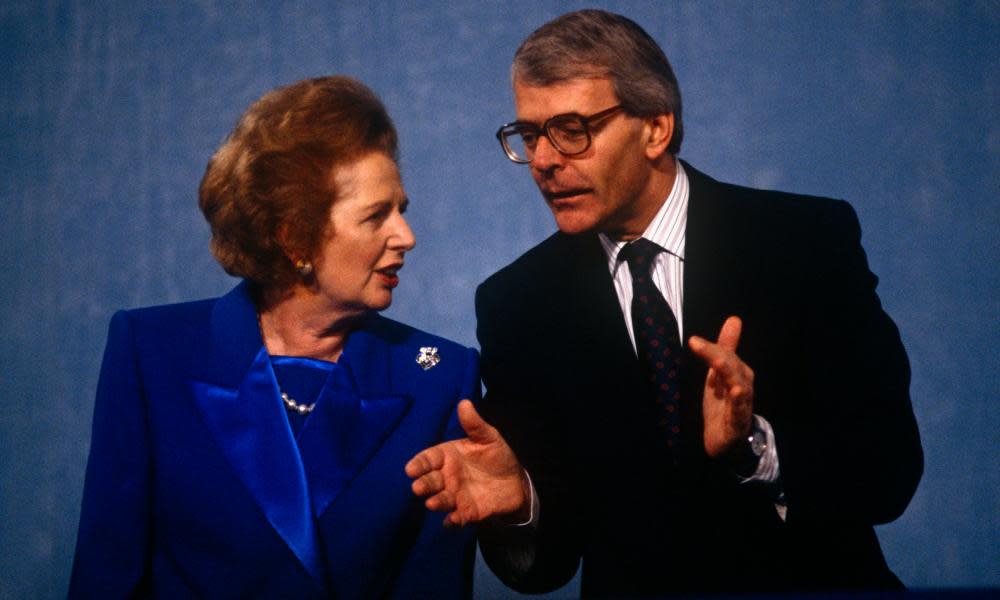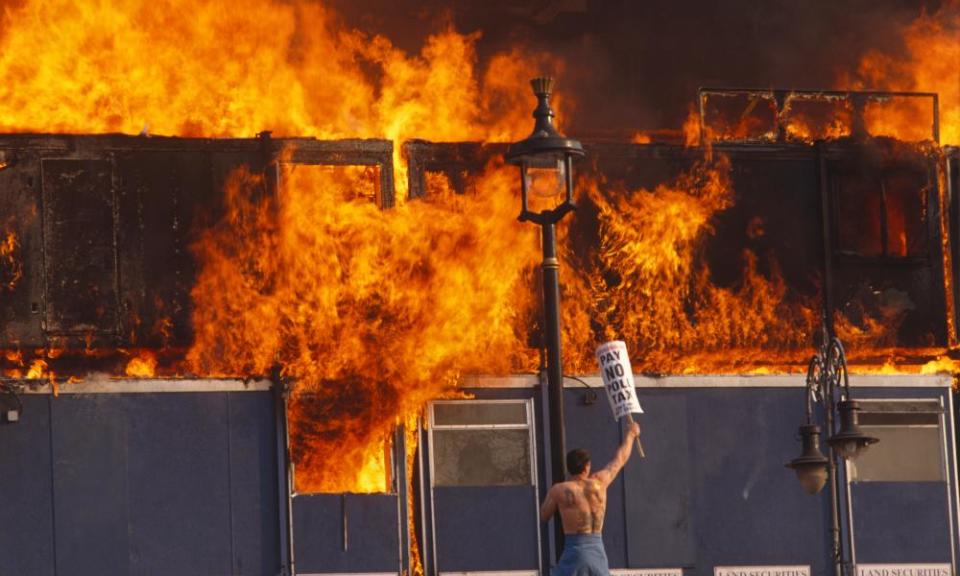'Unfair, uncollectable': how Major told Thatcher he was ditching poll tax

John Major wrote a five-page personal letter to his predecessor, Margaret Thatcher, to tell her of his government’s decision to abolish her flagship poll tax, which he described as unfair, uncollectable and indefensible.
Downing Street files released on Thursday show how Major tried to sweeten the pill with a handwritten note decrying “hurtful” press attempts to make “embarrassing” comparisons between the two of them and telling her that the Soviet premier, Mikhail Gorbachev, was keen to invite her to a dinner in her honour in Moscow.
The letter to Thatcher was written on 19 March 1991, two days before Major officially announced his plans to replace the poll tax, which had ignited a Trafalgar Square riot. To pour salt into the wound, the property-based council tax replacement was largely devised by Michael Heseltine who, more than anyone else, had brought about her downfall.
Major confirmed, just five months after the unpopularity of the poll tax had sealed Thatcher’s defeat in the November 1990 Tory leadership contest, that there was “tangible and growing resentment” among Conservative voters. They were being asked to foot the bill for the scale of unpaid poll tax which it “had proved beyond the capability of even well-run authorities to collect in full”.
The cabinet papers for 1991, released by the National Archives at Kew on Thursday, also show that Major, as had been the case for Thatcher before him, needed to be sent a reminder by Westminster council to register for the poll tax, or community charge as it was officially known.

They also reveal that when he was chancellor, it was the Treasury – and not Major himself – who had paid the poll tax second home “standard charge” due on his No 11 Downing Street flat.
The papers show Major tried to reassure Thatcher privately that he was trying to retain her poll tax principle that “most people should make some contribution” while linking it to ability to pay. However, his political advisers, Jonathan Hill and Sarah Hogg, were urging him to drop any talk of the “personal element living on” and instead be “absolutely clear” that “the poll tax is stone dead.”
It is notable that in his five-page “Dear Margaret” letter Major avoids any mention of the officially forbidden “poll tax” phrase. His energy secretary at the time, John Wakeham, told Major the instant description had been part of the problem – “Associating the word tax (bad) with poll (good) was a fatal trap” – the papers show.
Instead Major focused on telling Thatcher that nobody had envisaged annual bills of £400 on its introduction or that it would “prove very much more difficult to collect than we imagined”. It was particularly difficult to maintain an up-to-date register of everyone liable, he explained.
“It has proved beyond the capability of even well-run authorities to collect the tax in full. The result has been that responsible citizens, overwhelmingly our supporters, are being asked to make good the shortfall from non-payers. As this becomes more and more apparent and the shortfall increases from year to year, resentment is bound to grow: indeed it is already a tangible issue,” he told her.
“The decision to abolish the community charge was not taken lightly. But, having consulted widely throughout the party, I am convinced that it would never be accepted as equitable and that it would never be properly collectable either. I do not think we could long defend a situation in which some people were paying more in community charge than in income tax.”
Before signing off, Major tried to soften the blow by telling Thatcher that Gorbachev had said during a recent Moscow visit how much “he had always enjoyed his talks to you. He hopes very much that you and Denis will pay an early visit to the Soviet Union”. Major mentioned that a formal invitation, including a dinner in her honour, would soon be issued.
But he did not leave it there. Perhaps conscious that just days before Thatcher had been publicly quoted accusing him of “undermining her legacy”, he tried to mollify her by adding a handwritten note saying: “I am as fed up as you must be with the way the press seize on any issue to try and point up similarities/dis-similarities between us. I find it embarrassing and, more important, you must find it hurtful.”
There is no immediate reply from Thatcher recorded in the file but in his 1999 autobiography Major admitted the poll tax was her “most treasured policy”: “At the time the poll tax was the most vital policy issue facing me as prime minister. This was partly because it was, at base, all about Margaret Thatcher and her legacy.”
There is little evidence she was convinced. A year later, when the second volume of her memoirs was published, it included the withering judgment on her anointed successor that there was no such thing as Majorism: “I don’t accept the idea that all of a sudden Major is his own man,” she wrote.

 Yahoo News
Yahoo News 
